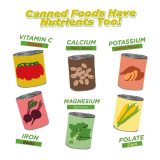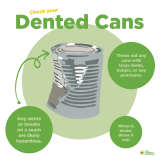We talked to our Nutritionist, Tara Bledsore, about the Nutritional Benefits of Canned Food.
Many Americans use canned foods for affordability and convenience. However, canned foods also have unexpected nutritional benefits. Research has shown that Americans who frequently eat canned foods take in more nutrient-dense foods and get significantly more vitamins, minerals, and fiber than those who infrequently eat canned foods.
Canned foods are an inexpensive way to add important nutrients to your diet. Canned beans, such as garbanzo, pinto, black or kidney beans, are packed with plant-based protein and fiber. Fiber is not only beneficial for building healthy gut bacteria, but is also great for lowering cholesterol and keeping blood glucose levels stable. Canned fish, like salmon, tuna, and sardines are rich in omega-3 fatty acids that may help to reduce the risk of heart disease. Antioxidants, like lycopene can be found in canned tomato products. Lycopene has been found to have anti-inflammatory properties which help to lower risks of certain cancers and heart disease. Canned pumpkin is an excellent source of vitamin A, and also provides blood pressure lowering potassium. Add some fiber to your soups or pasta dishes by making them with canned pumpkin.
You can reap the most benefits from canned food purchases by using the ingredient list and nutrition facts label. Look for fruit canned in 100% fruit juice, their own juice, or water to avoid added sugar. When purchasing canned meats, beans, or vegetables look for “no salt” or “low sodium” products to help keep your daily sodium intake within recommended limits. The American Heart Association advises to limit sodium intake to no more than 2300 mg per day for a healthy heart.
Taking advantage of canned foods can help you attain higher intakes of nutrient-dense foods, such as fruits, vegetables, meats, beans, and legumes. Stock your pantry all year long with these inexpensive, convenient, and nutritionally beneficial foods. Most canned products can last on the shelves for 1 to 5 years, but do not use if the can is dented, leaking, bulging, or cracked, as harmful bacteria may have been introduced.


